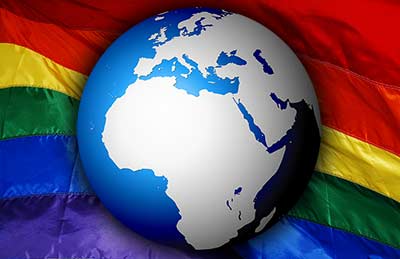Ten years of slow progress for global gay rights
 Ahead of Sunday’s International Day Against Homophobia and Transphobia (IDAHOT), a new report reveals that fewer countries now ban same-sex love compared to a decade ago.
Ahead of Sunday’s International Day Against Homophobia and Transphobia (IDAHOT), a new report reveals that fewer countries now ban same-sex love compared to a decade ago.
According to ILGA’s 10th annual report on state homophobia, authored this year by Aengus Carroll and Lucas Paoli Itaborahy, homosexuality is currently illegal in 76 countries.
This is a drop from the 92 countries that banned same-sex sex acts in 2006, when the organisation’s first report was produced.
“However,” said the authors, “the situation is still unacceptable: more than one-third of the world’s nations consider same-sex sexual activity illegal.”
They noted, on the other hand, that although 2013 saw an alarming rise in the number of countries considering a new wave of criminalisation through “homosexual propaganda” laws, “only a small number” actually implemented them.
Disturbingly, the death penalty remains a punishment for same-sex sex acts in a number of countries or regions.
This year’s report makes for fascinating reading. It reveals that:
- There are 117 countries (UN members) where same-sex sexual acts between adults in private are legal. (Mozambique and Palau decriminalised same-sex sex acts in 2014 and Lesotho in 2010.)
- There are 76 countries where same-sex sexual conduct is still illegal. Chad introduced a new Penal Code in 2014, punishing anyone who has sex with persons of the same sex.
- With regard to the death penalty, eight nations officially legislate for it, but only five (Mauritania, Sudan, Iran, Saudi Arabia and Yemen) actually implement it. A sixth country, Iraq, does not include the penalty in the civil code, but has judges and militias throughout the country that issue the death sentence for same-sex sexual behaviour. Some provinces in Nigeria and Somalia also officially implement the death penalty. The death penalty is also implemented for same-sex sexual acts in Isis-held areas.
- Brunei Darussalam is due to add the death penalty for same-sex sexual acts to the statute books in 2016 but it’s likely that (like Pakistan, Afghanistan and Qatar) it will not be actively implemented.
- To date, only four countries have adopted ‘homosexual propaganda’ laws: Algeria, Lithuania, Nigeria and Russia.
- Discrimination in employment based on sexual orientation is prohibited in 63 countries, including Chile (2012), Samoa (2013), Namibia (2004) and the city of Buenos Aires in Argentina (2015).
- A total of seven countries have a constitutional prohibition against discrimination based on sexual orientation, including Mexico (2011) and the Virgin Islands (2007).
- Hate crimes based on sexual orientation are considered an aggravating circumstance in 34 countries.
- Incitement of hatred based on sexual orientation is prohibited in 31 countries.
- Marriage is legal for same-sex couples in 18 countries, including Luxembourg and Slovenia (both in 2015). In Mexico and the USA, 37 states (plus the District of Columbia) allow gay and lesbian marriages. Finland approved marriage equality in 2015 (coming into force in 2017), while Estonia approved a similar law in 2014 (coming into force in 2016).
- Joint adoption by same-sex couples is legal in 19 countries. It was legalised in Luxemburg and Malta in 2014 and in Austria, Ireland and Slovenia in 2015.
ILGA Co-Secretaries General Ruth Baldacchino and Helen Kennedy commented that the report “provides us with a solid platform from which to understand, discuss, lobby, advocate and analyse further.”
“We find many brave individuals, organisations operating on shoestring budgets, networks of activists, scholars, policy-makers and other professionals, risking their livelihood (and often their lives) to fight for what is right,” added Baldacchino and Kennedy.
“We find lesbian, gay, bisexual, trans, intersex and queer people manoeuvring through political, social, religious, cultural and linguistic battles to be recognised and respected. These are efforts, initiatives and actions that empower us,” they said.
Leave a Reply